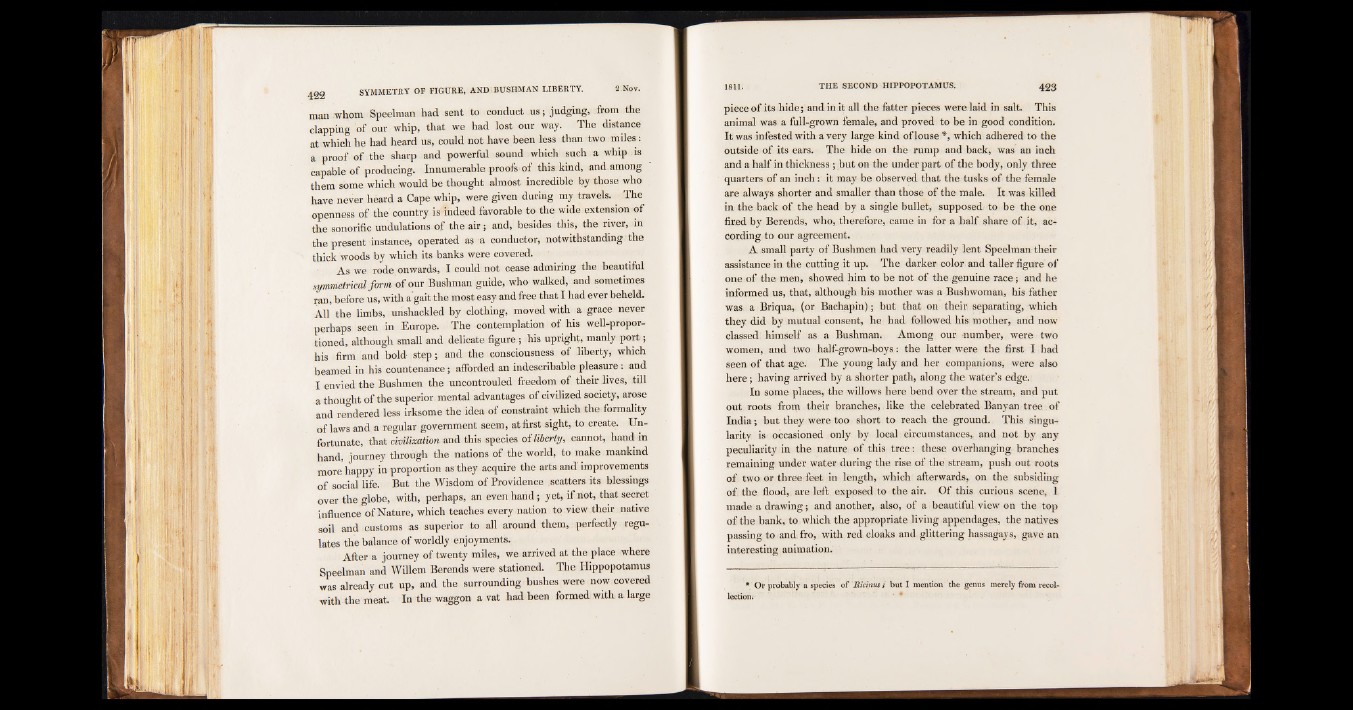
man whom Speelman had sent to conduct u s; judging, from the
clapping of our whip, that we had lost our way. The distance
at which he had heard us, could not have been less than two miles:
a proof of the sharp and powerful sound which such a whip is
capable of producing. Innumerable proofs of this kind, and among
them some which would be thought almost incredible by those who
have never heard a Cape whip, were given during my travels. The
openness of the country is indeed favorable to the wide extension of
the s o n o r i f i c undulations of the air; and, besides this, the river, m
the present instance, operated a? a conductor, notwithstanding the
thick woods by which its banks were covered.
As we rode onwards, I could not cease admiring the beautiful
s y m m e t r i c a l form of our Bushman guide, who walked, and sometimes
ran, before us, with a gait the most easy and free that I had ever beheld.
All the limbs, unshackled by clothing, moved with a grace never
perhaps seen in Europe. The contemplation of his well-proportioned,
although small and delicate figure; his upright, manly p o rt;
his firm and bold- step; and the consciousness of liberty, which
beamed in his countenance; afforded an indescribable pleasure: and
I envied the Bushmen the uncontrouled freedom of their lives, till
a thought of the superior mental advantages of civilized society, arose
and rendered less irksome the idea of constraint which the; formality
o f l a w s a n d a r e g u l a r g o v e r n m e n t seem, at first sight, to create. Unfortunate,
that civilization and this species of liberty, cannot, hand in
hand, journey through the nations of the world, to make mankind
more happy in proportion as they acquire the arts and'improvements
of social life. But the Wisdom of Providence scatters its blessings
over the globe, with, perhaps, an even hand; yet, if not, that secret
influence of Nature, which teaches every nation to view their native
soil and customs as superior to all around them, perfectly regulates
the balance of worldly enjoyments.
After a journey of twenty miles, we arrived at the place where
Speelman and Willem Berends were stationed. The Hippopotamus
was already cut up, and the surrounding bushes were now covered
with the meat. In the waggon a vat had been formed with a large
piece of its hide; and in it all the fatter pieces were laid in salt. This
animal was a full-grown female, and proved to be in good condition.
It was infested with a very large kind of louse *, which adhered to the
outside of its ears. The hide on the rump and back, was an inch
and a half in thickness ; but on the under part of the body, only three
quarters of an inch: it may be observed that the tusks of the female
are always shorter and smaller than those of the male. It was killed
in the back of the head by a single bullet, supposed to be the one
fired by Berends, who, therefore, came in for a half share of it, according
to our agreement.
A small party of Bushmen had very readily lent Speelman their
assistance in the cutting it up. The darker color and taller figure of
one of the men, showed him to be not of the genuine race; and he
informed us, that, although his mother was a Bushwoman, his father
was a Briqua, (or Bachapin); but that on their separating, which
they did by mutual consent, he had followed his mother, and now
classed himself as a Bushman. Among our number, were two
women, and two half-grown-boys: the latter were the first I had
seen of that age. The young lady and her companions, were also
here; having arrived by a shorter path, along the water’s edge.
In some places, the willows here bend over the stream, and put
out roots from their branches, like the celebrated Banyan tree of
India; but they were too short to reach the ground. This singularity
is occasioned only by local circumstances, and not by any
peculiarity in the nature of this tree: these overhanging branches
remaining under water during the rise of the stream, push out roots
of two or three feet in length, which afterwards, on the subsiding
of the flood, are left exposed to the air. Of this curious scene, 1
made a drawing; and another, also, of a beautiful view on the top
of the bank, to which the appropriate living appendages, the natives
passing to and fro, with red cloaks and glittering hassagays, gave an
interesting animation.
* Or probably a species of Ricinus t but I mention the genus merely from recollection,